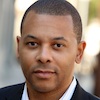01 Mar 2014 Blacks Must Speak Outside the Language of Race (Part 1), by Derryck Green
 Blacks must become multilingual.
Blacks must become multilingual.
I’m not saying that black folk should learn a second language such as Spanish or Chinese — although the fact that Hispanics are the dominant minority and China is ascending economically might make knowledge of these languages a handy skill.
No, it’s not as much about how things are being said but about what is actually being said: what message the words convey. The new language, for some, will be both a novel way of speaking and a new way of thinking.
I believe blacks need to learn to speak above and beyond the language of race.
It’s old. It’s tired. And, these days, the language of race is counterproductive.
Too many blacks, and especially those who claim to be our leaders, are unfortunately still masters of speaking in racial terms. Considering our history of slavery, Jim Crow and the Civil Rights movement, the fluency is understandable.
In the 21st century, however, the language of race is getting harder and harder for the rest of society to understand.
The old black/white paradigm isn’t the same as it was. The racial playing field is much more equal than it was even just a few years ago. New generations don’t obsess about, nor do they live by, racial stereotypes. The presence of Asians, Hispanics and — yes — other Africans, along with the many other races that constitute America, living together, now require a change in the vocabulary.
Furthermore, mainstream America is increasingly closing its ears to racial rhetoric — particularly the narrative of victimization.
Failing to recognize and adapt to this new reality could render many blacks culturally and politically irrelevant if something isn’t done soon.
Consider how one political party already seems to take blacks for granted while the other virtually ignores black America. Yet, both parties are scrambling for the Hispanic vote even though blacks remain a larger percentage of the voting public.
Why?
It’s because both parties understand racial linguistics and realize such rhetoric is only worth a finite amount these days. And, quite frankly, it’s patronizing.
For instance, during a speech at the 2011 Congressional Black Caucus Foundation’s annual conference, President Obama told the crowd to “put on your marching shoes.” He concluded: “Shake it off. Stop complaining, stop grumbling, stop crying… We’ve got work to do.”
In that speech, he cited the high black unemployment rate when he took office. This past January, black male unemployment was 12.1 percent. Black teenage unemployment was 38 percent! The percentage of Americans of all races participating in the workforce is near a modern low.
The jobs situation has not gotten any better for black Americans under President Obama’s stewardship.
Feeling used yet?
It’s examples such as this, where we are pressed into service without guarantee of relief, that prove why blacks must drop their racial obsessions — the language of race — and become “multilingual.”
On issues as diverse as education, economics, morality and family, it is obvious that there is no monolithic black political ideology. Polling actually shows that blacks fall all across the board politically — if not more conservative than liberal (despite steadfast loyalty to the liberal political party).
Willingness to accept this diversity of views, as opposed to the currently self-imposed and very strident political litmus tests, is a virtue. It is an asset that will increase the black community’s political value and make it relevant again.
Unwavering liberal black politicians may have power in Washington through seniority, but they don’t garner much respect. Has the Congressional Black Caucus’ alternative federal budget ever gone anywhere? And those of us not in elected office get to put on our marching shoes, but we are rarely allowed in and given a seat at the real table to power.
Expanding from the language of race to include our true political diversity — becoming multilingual — is an imperative for black America.
# # #
Derryck Green, a member of the national advisory council of the Project 21 black leadership network, received a M.A. in Theological Studies from Fuller Theological Seminary and is currently pursuing his doctorate in ministry at Azusa Pacific University. Comments may be sent to [email protected].
Published by the National Center for Public Policy Research. Reprints permitted provided source is credited. New Visions Commentaries reflect the views of their author, and not necessarily those of Project 21, other Project 21 members, or the National Center for Public Policy Research, its board or staff.



